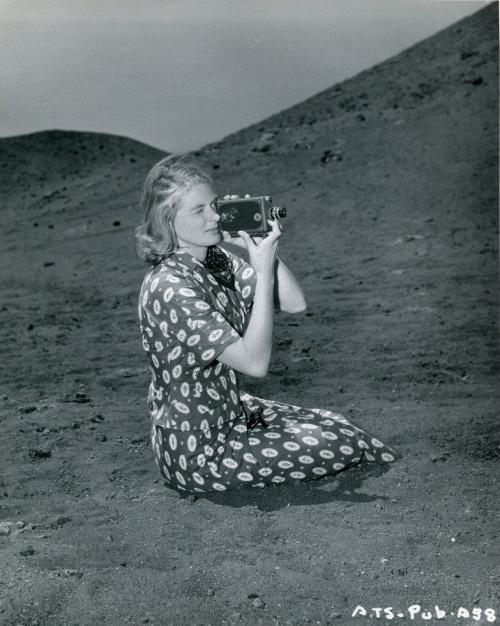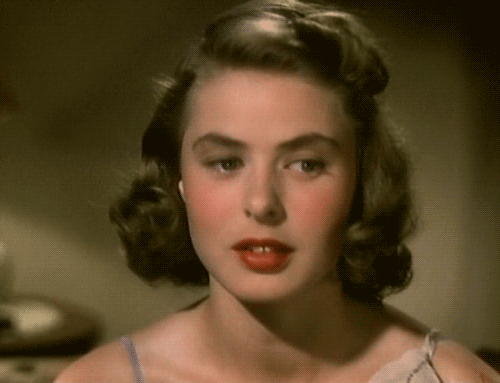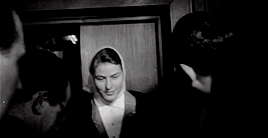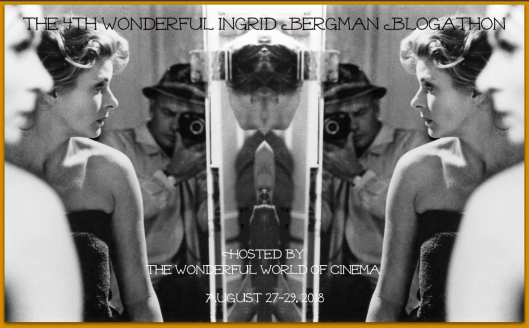Se você tivesse que escolher uma
palavra para descrever Ingrid Bergman, qual escolheria? As respostas variam.
Para Hitchcock, a palavra seria “musa”. Para Cary Grant, “amiga” para Roberto
Rossellini, “amore”. Para Pia, Robertino, Ingrid e Isabella, “mama”. Para seus
fãs, “deusa”. Para os admiradores de sua trajetória, “livre”. Para qualquer um
que ame cinema, “talento”.
If you had to describe Ingrid Bergman with only one
world, which one would you choose? The answers would vary widely. For
Hitchcock, it’d be “muse”. For Cary Grant, “friend”. For Roberto Rossellini,
“amore”. For Pia, Robertino, Ingrid and Isabella, “mama”. For her fans,
“goddess”. For the admirers of her life story, “free”. For
anyone who love cinema, “talent”.
Felizmente, nós não temos de
escolher uma única palavra, porque a própria Ingrid nos deixou muitas palavras.
Ela é provavelmente a atriz de cinema clássico que tem mais diários, cartas,
fotos e vídeos caseiros para serem apreciados. E estas fontes foram o ponto de
partida para o documentário “Eu sou Ingrid Bergman”, do diretor sueco Stig
Björkman. Todos estes materiais estão disponíveis para consulta na Coleção
Ingrid Bergman dos Arquivos de Cinema da Universidade Wesleyan.
Thankfully, we don’t have to choose only one word,
because Ingrid herself left many words for us. She was probably the actress
from the Golden Age who has the most diaries, letters, candid photos and home
videos to be appreciated. And these material sources were the start of the
documentary “Ingrid Bergman: in her own words”, by the Swedish director Stig
Björkman. All these materials are now available to be consulted at the Ingrid
Bergman Collection from the Cinema Archives at the Wesleyan University.
| A professora da Universidade Wesleyan, Jeanine Basinger, com o passaporte de Ingrid, ainda criança / Historian and Wesleyan professor Jeanine Basinger holds Bergman's childhood passport |
Sua primeira experiência no cinema
foi aos 16 anos, como figurante em “Landskamp” (1932), e ela ficou em êxtase
com o que viu. Em 1933 ela foi aceita na Academia de Arte Dramática da Suécia -
mesmo local em que Greta Garbo estudou - e em 1935 ela estava fazendo filmes,
sendo creditada e disputado pelos estúdios. É
maravilhoso ver fatos e cenas destes primeiros filmes.
Her first film experience was at age 16, when she
was an extra in “Landskamp” (1932), and she was ecstatic about what she saw. In
1933 she entered the Royal Dramatic School in Sweden - the same place Greta
Garbo attended - and in 1935 she started doing movies as a credited actress and
being disputed by studios. It’s wonderful to see stills and scenes from those
early movies.
Ingrid herdou do pai, que morreu
quando ela tinha 13 anos, o hábito de filmar tudo ao seu redor. Ela sempre
carregava uma câmera consigo, e por causa disso hoje podemos vê-la com seu
primeiro marido, Petter Lindström, na cerimônia de casamento, passeando pela
Europa e muito mais. Em um curto e assustador vídeo de 1938, um grupo de
nazistas marcha ao lado do carro deles, estacionado na rua, onde Ingrid está
encostada. Todos agem como se aquilo fosse normal. É um vídeo em cores, o que
faz tudo ainda mais realista. Isso não aconteceu há muito tempo. E alguns dos
nossos ídolos estavam lá testemunhando tudo.
Ingrid inherited from her father, who died when she
was 13, the habit of filming everything around her. She always had a camera
with her, and because of that we can see her with her first husband, Petter
Lindström, in their wedding, vacationing through Europe and more. In a chilling
footage, from 1938, a group of Nazi soldiers marches side by side with their
car, parked in a street, with Ingrid leaning on it. Everybody acts as if it was
normal. It’s color footage, making everything more palpable. It happened not so
long ago. And some of our idols experienced it firsthand.
Ingrid também escreve muitas
cartas. Boa parte da narração - a voz de Ingrid em sueco é de Alicia Vikander -
vem de trechos de cartas que ela escreveu para Mollie, uma amiga sueca, Ruth,
uma fonoaudióloga de Hollywood, e Irene, esposa de Selznick. Há também um trecho
de uma carta que o fotógrafo de guerra Robert Capa escreveu para Ingrid. Eles
se conheceram na Europa, onde Ingrid estava visitando as tropas
norte-americanas, e se apaixonaram. O mesmo aconteceu quando ela trabalhou com
Victor Fleming. Sua filha, Pia, tem uma teoria sobre estas paixões: homens que
trabalhavam atrás das câmeras faziam Ingrid se lembrar do pai.
Ingrid also wrote many letters. A lot of the
narration - Ingrid’s voice in Swedish is provided by Alicia Vikander - is
provided from passages of letters she wrote to Mollie, a Swedish friend, Ruth,
a Hollywood speech coach, and Irene, Selznick’s wife. There is also a passage
taken from a letter war photographer Robert Capa wrote to Bergman. They met in
Europe, where Ingrid was entertaining the troops, and fell in love. The same
happened when she worked with Victor Fleming. Her daughter Pia has a theory
about those love affairs: men behind cameras reminded Ingrid of her father.
Os vídeos caseiros feitos na
Itália, quando ela estava com Rossellini, são divertidos, emocionantes e cheios
de propósito, como a filha Ingrid menciona. Isso nos faz imaginar como Ingrid
seria se fosse diretora de cinema. Ela se especializaria em comédias? Ela
ficaria mais confortável na frente ou atrás das câmeras, ou talvez ambos?
The home videos she recorded in Italy, when she was
with Rossellini, are fun, touching and purposeful, as daughter Ingrid mentions.
This makes us wonder how Ingrid Bergman would be as a movie director. Would she
specialize in comedies? Would she be more comfortable in front of or behind the
cameras, or maybe both?
Ingrid diz que Humphrey Bogart era
“interessante”, porque não era um galã comum, chama Hitchcock de “muito
talentoso”, e Cary Grant de “um dos colegas de cena mais simpáticos” - e
Isabella ainda diz que Gran ensinou a mãe a não se levar tão a sério. Com Jean
Renoir, ela aprendeu que atuar em filmes não apenas ser outra pessoa, e tendo
isso em mente, ela pôde ter uma nova perspectiva acerca dos filmes que fez.
Ingrid calls Humphrey Bogart “interesting”, because
he’s not the average leading man, says Hitchcock is “very talented”, and Cary
Grant was “one of the nicest costars she worked with” - and Isabella adds that
Grant taught her mother to take herself less seriously. With Jean Renoir, she
learned that acting in movies is not only about being someone else, and with
this in mind she could have a new perspective of the movies she had acted in.
Quando Ingrid mudou-se da Suécia
para Hollywood, ela deixou Pia ainda bebê. Quando ela foi para a Itália, Pia
tinha 11 anos. E quando ela se separou de Rossellini e mais tarde se casou com
o produtor de teatro sueco Lars, ela não levou consigo as crianças. Mesmo
assim, nenhuma delas tinha coisas ruins para falar da mãe. Mesmo que desejassem
ter passado mais tempo com ela, eles sabiam que ela era preocupada - ela deu
uma pausa de dois anos na carreira quando Isabella fez uma cirurgia nas costas
- divertida, doce, surpreendente e carinhosa.
When Ingrid left Sweden for Hollywood, she left
Pia, still a baby. When she left to Italy, Pia was 11. And, when Ingrid
divorced Rossellini and later married the Swedish theater producer Lars, she
didn’t bring along her children either. Yet, nobody had a harsh word to talk
about their mother. Although they wish they had more time with her, they knew
she was caring - she stopped working for two years when Isabella had back
surgery - funny, sweet, amusing and warm.
Ingrid era uma mulher moderna que
se sentia incompleta quando não estava trabalhando e fazendo o que amava, mesmo
tendo uma família e uma casa para ocupar seu tempo - o que, de acordo com
algumas pessoas, são mais do que o suficiente para fazer uma mulher feliz. Mas
não me fariam feliz. E também não fizeram Ingrid feliz. Ela nuca estava
satisfeita, sempre queria mais. Na Suécia, ela queira ir para Hollywood. Uma
vez em Hollywood, ela decidiu ir para a Itália. E depois para a França. E então
para a Inglaterra. Ela enfrentou o julgamento hipócrita que todas as mulheres
livres enfrentam.
Ingrid was modern woman who felt incomplete when
she wasn’t working and doing what she loved, even though she had a family and a
house to keep her busy - which, according to some people, is more than enough
to make a woman happy. But not me. And not Ingrid either. She was never happy,
she always wanted more. In Sweden, she aspired for Hollywood. Once in
Hollywood, she decided to go to Italy. Then France. Then England. She faced the
hypocritical judgment all free women face.
Só um exemplo de hipocrisia: há um
trecho com Ed Sullivan perguntando a seu público se eles queriam que Ingrid
Bergman fosse entrevistada no seu programa. O documentário não mostra o
desfecho: o público disse Sim, mas Sullivan vetou a decisão. As pessoas queriam
vê-la e ouvi-la, mas os salvadores da família e da moral não queriam dar uma
voz a ela, e pintaram-na como prostituta.
Only one example of hypocrisy: there is footage of
Ed Sullivan asking his viewers if they wanted to see Ingrid interviewed in his
shows. The documentary doesn’t show the results: the public said Yes, but
Sullivan vetoed the actress. People wanted to see and hear the star, but the
mighty saviors of family and morale didn’t want to give her a voice, and
painted her as a whore.
De volta à pergunta inicial: Se
você tivesse que escolher uma palavra para descrever Ingrid Bergman, qual
escolheria? Algumas palavras são escolhidas por seus filhos para descrevê-la.
Isabella escolhe “charme”. Roberto escolhe “coragem”. Você não precisa escolher
nenhuma palavra. Ingrid Bergman nós deixou todas as suas palavras como um
precioso legado.
Back to the initial question: If you had to
describe Ingrid Bergman with only one world, which one would you choose? A few
little words are chosen by her kids to describe her. Isabella chooses “charm”.
Roberto chooses “courage”. You don’t have to choose a word. Ingrid left us all
her words as a precious legacy.
This is my contribution to the Fourth Wonderful Ingrid Bergman blogathon, hosted by my friend Virginie at The Wonderful World of
Cinema.








2 comments:
A beautifully written tribute to an amazing woman, Ingrid Bergman. You chose all the right words.
My word for Ingrid Bergman still is "Fascinating"! :D What a woman! This documentary proves it to us perfectly. I love your review of it as it not only gave us a good preview of what the film is about but also tells us why Ingrid deserves a lot of respect. A delightful read. Thanks a lot for your contribution to the blogathon!
Post a Comment